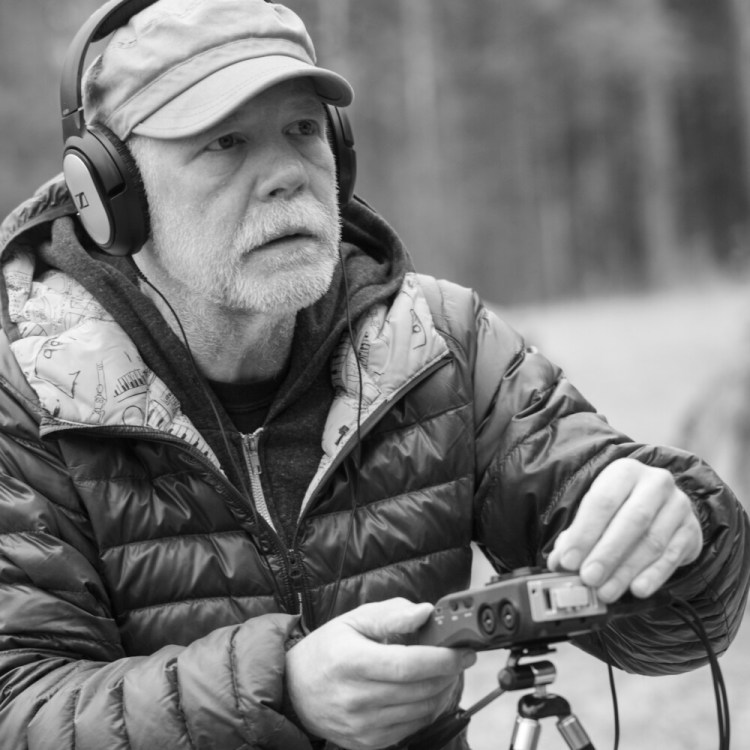The first time David Lamon heard the sound installation “Requiem,” which features the recorded sounds of 12 recently extinct birds and amphibians, it was a “sobering and startling experience.”
“It feels like the birds and other sounds — some toads and frogs mixed in — are right behind you,” said Lamon, the director of the Fields Pond Audubon Center in Holden. “Maybe that’s the point the artist is trying to convey: You feel like you’re experiencing these species, but they’re not there. They will never be there. Because they’re not here anymore.”
Musician and sound artist Steve Norton created the installation of loops of recorded wildlife calls using a computer program and four speakers that surround listeners, transporting them through sound to a faraway rain forest, volcanic island or other spots where the animals once lived. The show is up until Feb. 13 at the Fields Pond Audubon Center, playing in a room with windows that look out onto the fields of the preserve.
Norton, a jazz musician of 30 years — he plays woodwinds — created “Requiem” in 2018 while pursuing a Masters of Fine Arts degree at the University of Maine (he graduated last summer). After working 26 years as a software engineer in the Boston area, Norton moved to Maine to pursue a career in teaching (he’s still working on the professional transition).
He describes himself as a lifelong wildlife enthusiast and passionate hiker who learned about birds as a child from his father. He never travels without his binoculars and field guide and says environmental degradation, climate change and the loss of species have long troubled him. “Extinction was something I’ve thought about my whole life,” he said.
Since “Requiem” was first presented on the University of Maine’s Orono campus two years ago, the art installation has traveled to six other venues, including Maine Audubon, in Maine and Massachusetts.

The ivory-billed woodpecker, is one of 12 extinct species featured in “Requiem.” In the 19th century, loggers in Arkansas decimated the old-growth forest habitat of the bird, which was the largest woodpecker north of Mexico. Photo by Arthur A. Allen
Norton gathered the recordings of extinct species — including the ivory-billed woodpecker, Bachman’s warbler, and the golden toad — from the Macaulay Library at the Cornell Laboratory of Ornithology in Ithaca, New York, and The Amphibian Foundation in Atlanta, Georgia. All 12 species went extinct in just the last 60 years, and in each case humans were to blame. In most cases, their extinctions are blamed on habitat loss, introduced disease and introduced predators. Many scientists believe a sixth mass extinction is underway worldwide, caused by human overpopulation and overconsumption. Although species have always gone extinct, they are disappearing 100 times faster, at the very least, than the natural rate, scientists say.
The sound composition is run by a computer program that repeats a series of 12 different loops. Although the 12 species Norton features never shared a home range, the bird and frog calls sound random and natural, as they would in the wild. No two experiences of the recordings are the same because the loops don’t always start and finish at the same time. As a result, listeners never know what they will hear next, which was Norton’s intention.
Norton continues to research the extinct animals and to add to the exhibit each time it moves. At the Audubon center in Holden, he added a chart explaining why these species went extinct.
“It’s beautiful to listen to; it’s very relaxing,” Norton said. “I provide very little information. I want people hearing the voices and thinking about why they’re not here. A huge part of the message is that this is a unique moment in human history. They all are human-driven extinctions.”
Norton named the installment “Requiem” after the centuries-old form of liturgy and music. He said researching the project was draining and depressing.
“Here I am consciously invoking a form with a lengthy history, but also one with a well-known and easily relatable meaning: hope for the departed: “requiescat in pace” (Latin for “rest in peace”), Norton said. “As befits such a project, the making of it was filled with sadness.”
Send questions/comments to the editors.




Comments are no longer available on this story